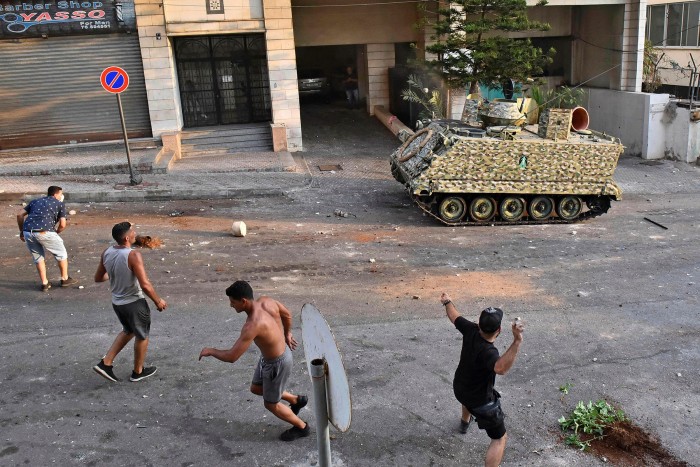[ad_1]
In the hours before veteran Lebanese politician Sa’ad Hariri visited President Michel Aoun last week, hopes were raised that after 10 months of fruitless negotiations the struggling country would finally get a new government.
But at their meeting last Thursday, the two men were unable to reach a deal and Hariri quit as prime minister-designate. Almost one year after the previous government resigned in the wake of a devastating blast at Beirut port, the country — deep in a financial and economic crisis — is back to square one.
Other countries, led by France, have urged Beirut to choose a new prime minister. EU officials have even suggested using sanctions to push Lebanese leaders to put aside their differences and take action. But senior officials at home and abroad acknowledge the depth of the crisis.
“There is a total inability of the Lebanese leaders to find a solution to the crisis that they have created,†said Jean-Yves Le Drian, the French foreign minister.
The international community has made the formation of a government a prerequisite for providing support to prop up the nation, whose collapse has been caused by decades of mismanagement and corruption that has been exacerbated by the pandemic.
But despite the urgent need for an administration that can push through reforms and negotiate a bailout with the IMF, analysts have said a government is unlikely to be formed before parliamentary elections next year.
Even with the international pressure, including two visits by French president Emmanuel Macron over the past year and the threat of sanctions, “the next deadline everyone seems focusing on is the parliamentary electionâ€, said Sami Nader, the Beirut-based director of the Levant Institute for Strategic Affairs. “Any kind of workable government will need [at least] three to four months to get formed,†warned Nader. “On the Lebanese clock, this is the best-case scenario.â€
Rafic Chlala, a spokesperson for Aoun, said new parliamentary consultations to name a fresh premier-designate would not begin officially until late this week, after the Eid al-Adha religious holiday. Chlala said he did not expect another long formation process.
But “you can see that everybody [including Hariri] is operating around the electionsâ€, said an adviser, who asked for their political affiliation not be mentioned. It’s “very possible†that there will be no government before next May, the adviser said. They added: “No Sunni in Lebanon would dare at this point†accept the premier-designate role, a position reserved for a Sunni Muslim under the national pact on the distribution of key offices.

Hariri, who has been prime minister three times, is the Sunni community’s most influential leader thanks to his father Rafiq, Lebanon’s celebrated post-civil war premier. Rafiq was murdered on Valentine’s Day 2005 in a plot orchestrated by members of Hizbollah, the Iran-backed and Syria-allied paramilitary movement, an international tribunal found.
Not only does 2022 herald a general election, but Aoun’s six-year term will also expire — setting the stage for further political chaos. In this context, politicians are wary of putting themselves forward, only to be punished by voters next year for their failures, analysts said.
The last elections in 2018 tipped the scales against Hariri, with gains for Hizbollah and its allies. A mass protest movement, which erupted in October 2019, revealed widespread disillusionment with established political parties, making next year’s election outcome hard to predict.
It is also unclear whether an election will deliver a conclusive outcome. There could still be fraught negotiations over cabinet positions.
Hariri and Aoun have blamed each other for the failure to finalise a government. Hariri has said Aoun was blocking his constitutional right to pick his own ministers, while Aoun argued that Hariri was being inflexible.
For a country in the grip of hyperinflation with state institutions such as the army warning that they are on the verge of collapse, the danger is that it cannot wait long. Donors are now loath to hand funds to a political elite accused by protesters of widespread corruption, preferring to focus assistance on critical institutions such as the Lebanese Armed Forces.
Paris has scheduled another aid conference for August 4 — the anniversary of the explosion that killed over 200 people. Envoys from Paris, Washington and Riyadh held talks about Lebanon this month, signalling a united front.
Saroj Kumar Jha, the World Bank’s director for the Mashreq region that covers Lebanon, said the international community was showing “good solidarity with the Lebanese people, [as] they want to be able to helpâ€. He added that the focus was on providing life-saving aid.
The World Bank is concentrating on a $246m project to help 200,000 “extremely poor households†in Lebanon with cash, the kind of social safety net that the government, which defaulted on its debt last year, does not have the resources to launch itself. But this programme has already been delayed by four months, Kumar Jha said. Lebanese lawmakers have disagreed with the bank about the approach for monitoring how the cash is disbursed and how families are selected.
Kumar Jha said he was “hopeful†that a credible government could be formed soon to clean up Lebanon’s banks and secure basic provisions such as electricity. But he added: “[T]hey cannot afford to lose a day.â€
[ad_2]
Source link






